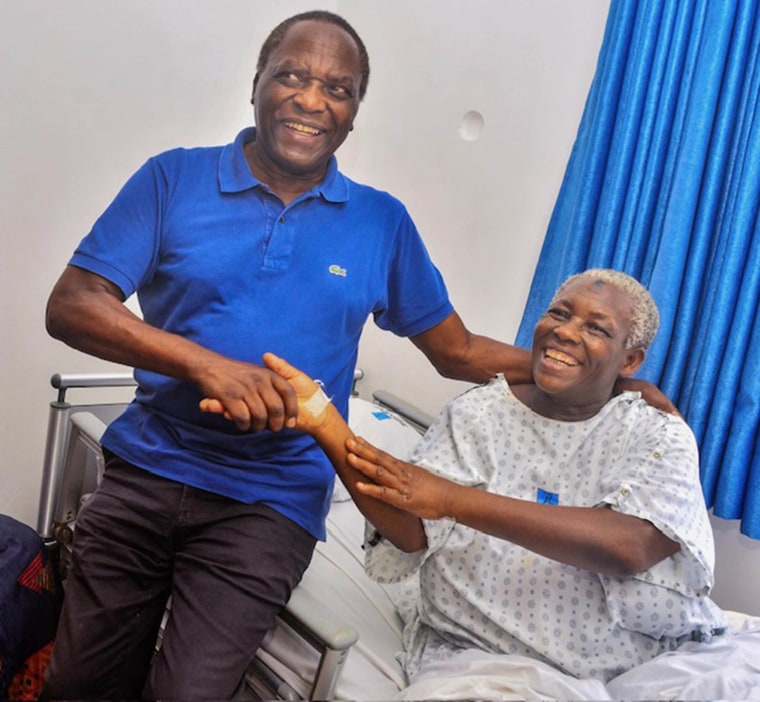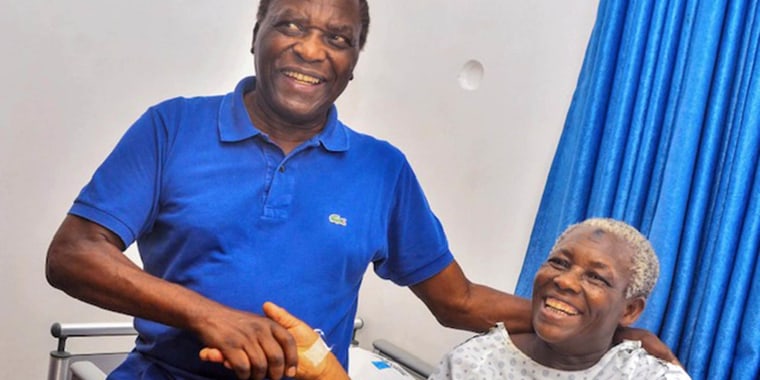A 70-year-old woman has given birth to twins in Uganda, she and her doctor tell TODAY.com.
Safina Namukwaya got pregnant with IVF and had a boy and a girl via cesarean section at Women’s Hospital International and Fertility Center in Kampala, Uganda, on Nov. 29, according to her and her doctor.
The babies were born at 31 weeks gestation and each weighed more than 3 pounds, according to Namukwaya’s fertility specialist, Dr. Edward Tamale Sali.
Namukwaya says she also has a 3-year-old daughter waiting for her when she returns to her rural village in Uganda, a country in east Africa.
“I feel great,” Namukwaya tells TODAY.com through an interpreter on a video call. “Some might argue that 70 years is old, but God decided that I get to have twins at 70. There is no one that can put a limit on God’s authority and power."
The mother of three, who says she has been alternating between breast feeding and pumping, notes that she has a strong support network back home. TODAY.com has not been able to independently verify her age.
“Some households will be helping me with washing and the babies because of my advanced age,” Namukwaya says.

To help with the conception of her children, Namukwaya turned to in vitro fertilization (IVF). Due to Namukwaya’s age, she used donor eggs and her partner’s sperm.
“We implanted four embryos, and then of course, she conceived the twins,” Sali tells TODAY.com.
In the U.S., the upper age limit for in-vitro fertilization (IVF) and other medically assisted reproduction is generally mid-50s.
The American Society for Reproductive Medicine (ASRM) states that embryo transfer is “discouraged in women over age 55.”
“In my opinion, what happened with this 70-year-old woman is so irresponsible,” Dr. Brian Levine, a practice director at New York City’s fertility clinic CCRM, tells TODAY.com.
Sali says Namukwaya's twins are in the hospital’s neonatal intensive care unit (NICU) because they were born prematurely, but he quickly adds that they are doing “just fine.”
When Namukwaya came to Sali earlier this year and explained that she wanted to grow her family, he didn’t hesitate to treat her.
“It’s her human right. It’s her body,” he explains. “She’s physically fit.
Namukwaya had previously been being mocked as a “cursed woman” for not having children before she had her daughter in 2020, according to a previous report by the news agency Agence France-Press (AFP).
Dr. Edward Tamale Sali’s son Arnold Ssali, a clinical embryologist who is familiar with Namukwaya’s case, tells TODAY.com that in African culture, “it’s all about family — the more people, the better.” He says Namukwaya has said, "It’s always better to have more than less.”
There were risks involved. Pregnancy complications such a gestational diabetes, which Levine says are a “nuisance” for a 40-year-old, could be “catastrophic” for a 70-year-old, he says.
“Data shows that women who give birth over the age of 50 have elevated rates of hypertension, gestational diabetes and preterm labor,” Levine said. “If a 70-year-old gets a blood clot, suffers a stroke, or has a heart attack, the kids will be developmentally and possibly physically delayed. And who is going to take care of these medically fragile kids when their parents die?”
Carmen Bousada is listed in the Guinness World Records as the oldest woman to give birth. In 2006, Bousada, then 66, welcomed twin boys after receiving IVF treatments. Bousada died in 2009.
